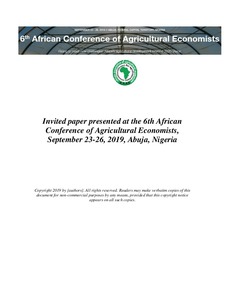Does the adoption of soil carbon enhancing practices pay off? Evidence on maize yields from Western Kenya.
Soil carbon enhancing practices (SCEPs) have been proven to be low-cost solutions in
enhancing agricultural productivity and alleviate the detrimental effects of climate change.
These practices can be adopted as complementary or as substitute practices due to their
associated ecological benefits and cost. In view of this, there is limited literature on the impact
of adopting a combination of SCEPs since their effect may be lower or higher than individual
technologies. A structured survey was utilized to collect data from 334 households in Western
Kenya. The study utilized the multinomial endogenous treatment effect model to assess the
determinants and impact of adopting on maize yield. The results reveal that adoption is
influenced by plots specific characteristics (distance to the plot and tenure system), external
support factors (access to credit and farmers participation in markets), tropical livestock units
and literacy level. In addition, the results showed that adoption of farmyard manure,
intercropping, and intercropping and farmyard manure combination has a significant and
positive impact on maize yield. This implies that there is a need to promote SCEPs adoption
among smallholder farmers given its positive impact and associated low cost of implementation

